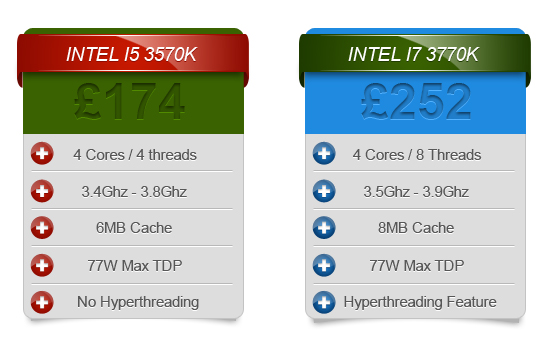The question ‘what the difference is between and Intel Core i5 3570K and an Intel i7 3770K’ is being asked everyday by someone some way or another. Whilst it’s a fairly simple answer it’s not always obvious and the differences are never explained which can still leave questioners a little confused.
What is the same?
Let’s start with what the same is because there are more similarities than differences. The Intel Core i5 3570K and Intel Core i7 3770K both have;
The same amount of cores (4)
The same DMI (5GT/s)
The Same Intrusion Extensions (SSE4.1/4.2, AVX)
A Max TDP of 77W
Are of the same manufacturing lithography (22nm)
Exactly the same memory Specs – Max (32GB), Type (DDR3 – 1333/1600MHz), Channels (2) and bandwidth (25.6GB/s)
The same Intel HD 4000 graphics chip
Intel Turbo boost 2.0 Technology
An unlocked multiplier
There are plenty of others such as the packaging and other features but they are really not relevant.

Price
This is the most obvious difference between the chips. The Intel i5 3570K is currently priced around £174.00 and the Intel i7 3770K at around £252.00, both prices including UK VAT at 20%. These prices may fluctuate slightly depending on the market but there will always be this gap of around just over £75.00 no matter how much they go up or down. CPU prices generally remain about the same throughout their shelf life but when a new CPU technology comes out there can be a slight drop in price to clear old stock however there will almost certainly be a price difference of around 44%.
Number of cores
Essentially, it’s the same. Both processors have 4 cores. The difference comes with the number of threads. All 3rd generation Intel i5 CPU’s have 4 threads and all 3rd generation i7 CPU’s have 8 threads. These extra threads come from a technology known as ‘hyperthreading’ where each i7 core has 2 threads unlike the i5’s one core one thread.
Information on hyperhtreading could be an article on its own but the easiest way to explain what it is, is to say that it artificiality divides each core into 2, presenting an operating system with 8 ‘logical processors’ instead of 4. The result is applications including operating systems, can load each physical CPU core more efficiently which therefore makes processing tasks more efficient and therefore faster.
Hyperthreading is not exclusive to i7 processors, the latest Intel Core i3 CPU’s also have this feature on a more toned down scale. I3’s have 2 cores and therefore 4 threads on total. That does not mean an i3 is as good as an i5 CPU as a ‘thread’ is not as good as a proper ‘core’.
It can be a bit of a mindbender but it can leave people confused as to how it affects their choice of CPU when considering a custom built PC. In short an i7 CPU is faster than an i5 CPU in applications that can make use of these extra threads.
Problem is, there are not many applications out there that make use of that many threads. The same can be said for the AMD FX CPU’s that have a whopping 8 cores per CPU. Generally tasks like gaming, watching films and looking at photos don’t make use of all these extra ‘logical processors’. Of course, there are the odd exception and the odd game that will do, but for most there is no performance advantage.
This efficiency comes into its own right when an application can make use of the extra threads. This includes tasks like video and music editing, multitasking and of course the odd game. This is where the extra cost and performance can be justified.
Core speed
The Intel Core i7 3770K is 100Mhz faster at stock speed and when turbo boost 2.0 kicks in. That’s it! That is 2.94% at stock speed and even less when turbo mode is active, 2.63%. For 44% more in cost you are far better overclocking an i5 3570K than to spend the extra for just 100Mhz.
Cache
Cache is a cache used by the processor to reduce the time to access memory. It acts as a ‘go between’ the CPU itself and the computers RAM. It’s very small but very fast and therefore does not need to be big.
In today’s standards cache is almost irrelevant when choosing a processor for a computer as it’s more than big enough for pretty much everything. The 3570K has 6MB and the 3770K has 8MB. Pitch both processors together in a ‘cache test’ in everyday tasks and there would be no noticeable improvement. There is small value in having the extra cache when processing lots of data in a server environment of heavy multimedia editing.
That’s it!
Not a lot is it? In short you can summarise it as the i7 3770K has hyperthreading, faster core clock and a bit more cache. Depending what the custom built PC is being used for will help you decide what processor is suitable.
We think spending the money on a decent processor cooler and overclocking the i5 3570K and putting what you save towards other parts like a better graphics card is a better choice than opting for a i7 3770K, unless you are doing any kind or multimedia editing then the i7 3770K would be the way to go and you still have the choice of overclocking that too.

